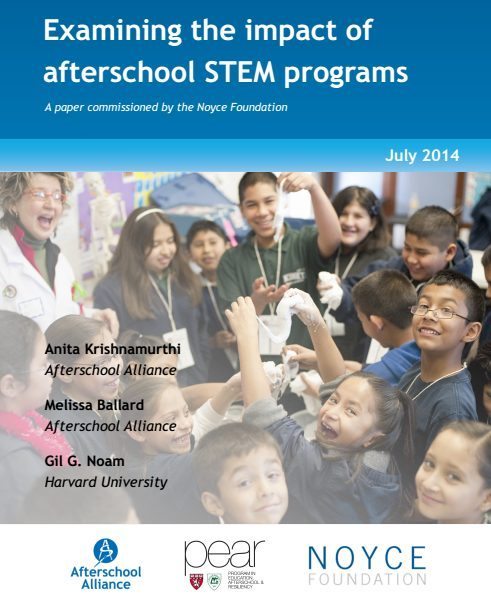Today, many afterschool and summer programs include science, technology, engineering and math (STEM) as a standard part of their comprehensive programming.
Afterschool providers recognize the importance of improved STEM education for their students and that hands-on, inquiry-driven STEM is in line with afterschool’s overall approach to education. Practitioners are able to directly see the impact afterschool STEM programs have on students—they see youth engaged in and excited about STEM activities, asking questions, and wanting to learn more.
However, funders, policy makers and other stakeholders often want data that substantiates such claims and demonstrates positive changes in a variety of outcomes: interest and engagement in science, greater knowledge of STEM careers, election of school science classes, and, sometimes, improved test scores in science and math.

Several themes emerged in our analysis:
- Afterschool STEM programs are successful in engaging and retaining large numbers of students from diverse populations.
- Young people in these programs express curiosity and interest in STEM subjects, in ways that extended that interest in school and out of school.
- As they participate, young people gain real skills and the ability to productively engage in STEM processes of investigation.
- Youth learn essential STEM-relevant life and career skills.
- Participants come to understand the value of STEM in contributing to society and solving global and local problems. They begin to see how STEM intimately connects to their everyday lives.
- Youth display an increased awareness of career options, as well as a nuanced understanding of those careers.
- Afterschool STEM programs can have an impact on academic performance.
Consistent findings across the programs discussed in this paper, and those seen in an earlier paper, give us confidence that we are seeing a real phenomenon: students participating in afterschool STEM programs have immediate and long-term gains on a number of STEM-related dimensions. While the findings in this paper are not intended as a representative sample of the afterschool field as a whole, it does provide us an understanding of what strong programs can achieve.
The findings of this paper demonstrate that afterschool and summer STEM programs play a very important role in STEM education and must be considered a vital part of the K-12 STEM education ecosystem.
This blog entry by Melissa Ballard was originally published on the Afterschool Alliance’s Afterschool Snack Blog.